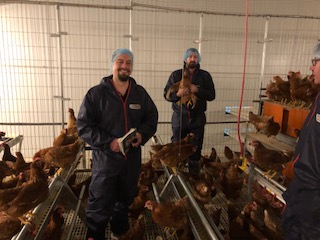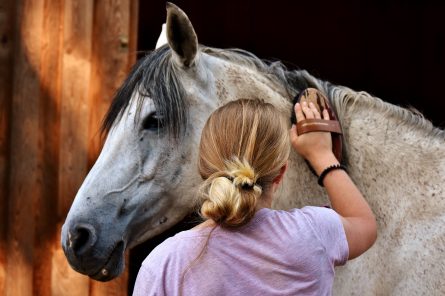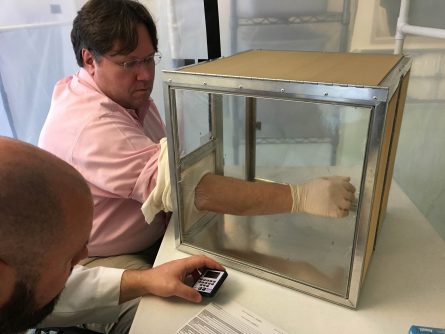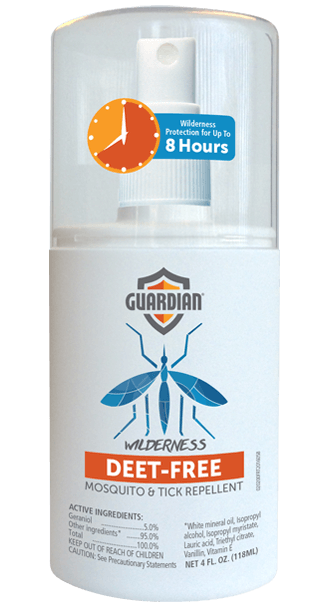Late last year Morrisville-based TyraTech, developer of non-toxic insect and parasite controls, sold the rights to its successful Vamousse brand of pesticide-free head lice products to focus on the more lucrative animal health market.
“Animal health is ten times the size of the human heath market,” explains Bruno Jactel, D.V.M., TyraTech’s chief executive officer. “There are much bigger unmet needs in animal health.”
Now the company is beginning to make headway in the $10 billion global market for insect and parasite controls in livestock and companion animals.
TyraTech recently signed an exclusive agreement with SmartPak, this country’s largest retailer of equestrian products, to distribute OutSmart, its fly, tick and mosquito repellant spray for horses and riders. SmartPak will also launch this year a roll-on formulation of OutSmart for use on the face and around the eyes of horses.

— TyraTech photos
Meanwhile, U.S. sales of TyraTech’s PureScience brand of poultry mite dust have more than doubled, thanks to a distribution agreement with MWI Animal Health, the country’s biggest distributor of animal health products, and heavy use by CalMaine Foods, the biggest egg producer. The product kills the northern fowl mite, a blood-sucking parasite that plagues poultry flocks.
The poultry mite dust will be introduced to the larger European poultry market this year for the control of red mites, opening doors for other TyraTech products now in development.
Those products include a control for coccidiosis, a contagious infection by protozoa that damages the intestinal tract of chickens and a control for intestinal and stomach worms in cattle, goats, sheep and other ruminants.
“We are pleased to show that, in a short period of time, we are making significant progress in developing new products and solutions for some of the largest animal health market segments and to answer some of the biggest unmet needs,” Jactel says.
Alternative solutions
The company’s alternatives to synthetic pesticides appear to have a promising future in a world seeking greener solutions to health and agricultural problems.
An estimated 10 quintillion insects inhabit the earth (that’s 10 followed by 18 zeros), or about 1.3 billion insects for every human. While many are beneficial to our existence, others cause serious diseases and economic losses.

against the poultry red mite, the most significant
laying-hen pest in Europe.
Close to a billion pounds of chemical pesticides are used annually around the globe to combat these pests. Meanwhile insects and acarids (mites and ticks) are developing resistance to many traditional synthetic pesticides, leading to overuse, high toxicity and environmental damage.
“Consumers want food that is clean and healthy,” Jactel says. “That’s really a major trend.”
Yet producers of animal food protein remain largely dependent on chemical pesticides, “so there is a gap between supply and demand,” he says. “That gap presents opportunities for companies like us. There is a big need for alternative solutions that work in a different way. We at TyraTech bring that kind of innovation in the market.”
The company says its products are effective, environmentally safe, easy to use and affordable.
“These are the factors that help us to penetrate the market with our producers,” Jactel says.
Products born of serendipity
TyraTech’s technology platform started with a simple observation made in a cancer research lab at Vanderbilt University’s Ingram Cancer Center more than a decade ago. Researchers there noticed that some of the essential oils they were using in their cancer experiments were apparently repelling insects in the lab.
This accidental discovery triggered further investigation of the plant-based oils to better understand and exploit their insecticidal and repellent properties.

Outsmart flying insect repellent for horses.
“TyraTech has taken these natural properties to a new level by a patented cell-based process to screen and select synergistic ingredients for greater efficacy than can be seen with the natural ingredient alone,” says Jactel. “By combining inert materials that enhance the availability or potency of active ingredients, new levels of effective, but safe, insecticides and repellents have been achieved.”
The company uses ingredients that have been recognized as safe by regulatory agencies in the United States and Europe. Product labels include thyme oil, cinnamon oil and geraniol, the primary component of rose, palmarosa and citronella oils.
TyraTech’s products target insects and parasites with a combination of chemical and physical actions.
The physical action often involves compromising the exoskeleton of an insect and causing osmotic stress or other disruption to internal systems, resulting in death, Jactel explains.
The chemical action relies on targeting the cellular receptor for tyramine, a neurotransmitter. Blocking the receptor is believed to alter the chemical responses of insects, shutting down their basic neurological functions.
TyraTech has 68 granted or pending global patents for its technology and product formulations.
Vamousse validation
The company’s first product line, Vamousse, was a range of safe, non-toxic, over-the-counter solutions for controlling head lice in children.
Vamousse shampoo, mousse and household lice and lice egg treatments are now sold nationally in over 25,000 stores, including Walmart, Walgreens, Rite Aid and CVS Health, and in several thousand stores and pharmacies in Europe.
TyraTech sold the Vamousse product line last December to the British specialty pharmaceuticals company Alliance Pharma for $13 million in cash and up to $4.5 million more, conditional on future sales targets.
“I believe that the sale of Vamousse is a clear validation of our ability to create value through the development of nature-derived products, which are both safe and effective,” says Jose Barella, chairman of TyraTech. “Our objective is now to reproduce the technology and business success we had in the human health and household products segments, in the larger markets of animal health.”
Other TyraTech products include PureScience fly and roach control and PureScience tech dust insect control for the swine industry, but the company is focused on the poultry industry for now.
“There is a bigger demand for poultry than swine for insect control,” Jactel says.

In the human health market, TyraTech also sells an all-natural mosquito and tick repellent, marketed as Guardian, that it says is more effective than 15 percent solutions of diethyltoluamide, or Deet, the most popular insect repellant on the market.
Guardian products are sold nationally on Amazon and in some Kroger supermarkets, and in Europe. However, TyraTech is not focused on commercializing Guardian until the product obtains full registration status with the Environmental Protection Agency.
“The objective is to seek stronger health claims, which would allow us to compete more effectively with the major players in the category,” Jactel says. “We are currently optimizing the formulation to ensure the best possible combination of efficacy, safety and cosmetics before entering the formal preparation of the registration dossier.”
The new formulations are in lab testing now and should move to field testing this summer, he says.
An international presence
Founded in 2004, TyraTech moved to Morrisville from Melbourne, Fla., in 2011 “to take advantage of the Research Triangle Park with biotechnology and ag connections and partnership potential, strong university support, and well-known concentration of scientific minds and a great pool of highly skilled professionals,” Jactel said.

When the relocation was announced, TyraTech’s non-executive chairman at the time, Alan Reade, also cited Morrisville’s proximity to N.C. State University, “which has strong programs in entomology and veterinary sciences, which we hope to draw upon as we expand.”
The company has since partnered with NCSU on in-vitro tests of its control for Eimeria, the protozoa that causes coccidiosis, and Histomonas meleagridis, a similar parasite.
TyraTech, which outsources its manufacturing and sales, has about 20 employees.
The company has been listed on AIM, the London Stock Exchange’s market for smaller growing companies, since 2007.
“In 2007, TyraTech had strong connections with U.K. investors who believed in the future of the company,” Jactel explained. “Beyond this, TyraTech has global investors and a growing international presence.”
The company’s product revenue of $0.9 million from continuing operations in 2017, “while modest,” was an increase of 169 percent over the previous year’s revenue, Jactel says.
This “reflects the traction that our products have with equine owners and poultry producers,” he says. “We are seeing that this trend continues at the beginning of 2018 in parallel with our focus now on the animal health market.”
Jactel has substantial product experience in animal health. Prior to joining TyraTech in 2013, he held senior positions during 12 years at Merial Ltd., then the Animal Health subsidiary of the Sanofi Group and now a unit of Boehringer Ingelheim. During his time there, Merial built the most successful consumer brand in animal health history with Frontline, the blockbuster flea and tick preventative for pets.





























